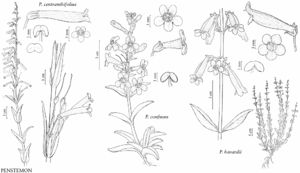Penstemon centranthifolius
Scroph. Ind., 7. 1835. (as Pentstemon centranthifolium)
Stems ascending to erect, 30–120 cm, glaucous. Leaves glabrous, glaucous; cauline 5–11 pairs, short-petiolate or sessile, 40–100 × 10–40 mm, blade ovate to lanceolate, base tapered to auriculate-clasping, margins entire, apex rounded to acute. Thyrses interrupted, secund to ± cylindric, 15–60(–100) cm, axis glabrous or obscurely scabrous, verticillasters 8–18(–22), cymes 1–5(–11)-flowered; proximal bracts ovate to lanceolate, (3–)7–25(–87) × (1–)3–14(–30) mm; peduncles and pedicels erect, glabrous or obscurely scabrous. Flowers: calyx lobes ovate to lanceolate, 3–6 × 2–3 mm, margins erose, glabrous; corolla scarlet, without nectar guides, nearly radially symmetric, weakly bilabiate, salverform, 25–33 mm, glabrous externally, glabrous internally, tube 8–10 mm, throat slightly inflated, 4.5–6 mm diam., rounded abaxially; stamens: longer pair reaching orifice, pollen sacs explanate, 0.9–1.2 mm, sutures smooth; staminode 13–14 mm, terete to slightly flattened distally, 0.1–0.3 mm diam., tip straight, glabrous; style 18–27 mm, exserted. Capsules 8–11 × 6–7 mm. 2n = 16.
Phenology: Flowering Feb–Jul.
Habitat: Hillsides, chaparral, oak, pinyon-juniper, and Joshua tree woodlands, coastal sage scrub, pine forests.
Elevation: 0–1800 m.
Distribution
Calif., Mexico (Baja California).
Discussion
Penstemon ×parishii A. Gray, a naturally occurring hybrid between P. centranthifolius and P. spectabilis (A. D. Wolfe and W. J. Elisens 1993), has been reported from Los Angeles, Riverside, San Bernardino, and San Diego counties, California (D. D. Keck 1937; Paul Wilson and M. Valenzuela 2002). A wild hybrid between P. centranthifolius and P. eatonii also was reported from San Bernardino County, California (Wilson and Valenzuela). Penstemon ×dubius Davidson was described from Mount Lowe in the San Gabriel Mountains, Los Angeles County, California, growing with P. centranthifolius and P. grinnellii. Hybridization between P. centranthifolius and P. grinnellii has been documented using allozyme and DNA data (Wolfe and Elisens 1993, 1994).
Three southern and central Californian tribes of Native Americans used Penstemon centranthifolius for drugs, food, and decorations (D. E. Moerman 1998).
Selected References
None.
